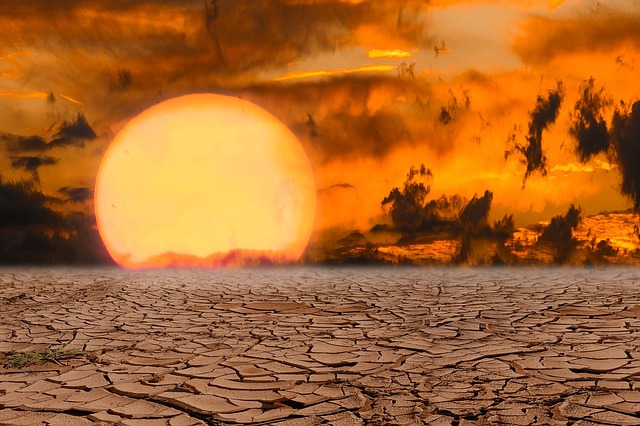clear

source:
Gellinger
I'm going to focus on the belief component of this question more than climate change. One interesting facet of public debate surrounding climate change is the underlying conversation that is taking place about how belief itself is formed. We're living in a time where those who argue in favor of climate change and those who argue against it both appeal to the irrefutability of scientific findings to justify their belief. However, much more seems to be at stake than simply establishing who is right and who is wrong based on evidence. Why? Research in psychology and neuroscience indicates that beliefs are rarely simply an understanding of facts based on evidence. Much more is going on. Peoples' beliefs are often inextricably intertwined with a person's sense of self-worth and their understanding of their place in the world. A recent study on what happens in the brain when beliefs are being questioned revealed a strong stimulation of the amygdala; that part of the brain which govern the fight or flight response. A chain of biological changes occur, priming the body to respond to danger. As a result, when beliefs collide, conversations are frequently underscored with acrimony, fear and anger. Given this, what can we do to promote healthier public debate about issues of global concern? That's a tough question. Perhaps a deeper understanding of how our brains work when it comes to belief may at least equip people with a greater capacity for empathy?
 3
3
clear
The question is wrong. There is no belief in climate change, it is observed phenomenon, and in addition it is supported by scientific/empirical evidence. For the opposing side it could be belief (as a standpoint unsupported by facts) that there is no climate change, or it could be some other ideological reason/s. In short, there is science behind on of the standpoints, and there is absence of science behind the other.
 1
1
clear
Climate has never been constant. So why do we think human activities are responsible for the change occurring now? In recorded history, climates have been both significantly warmer and colder than the present. Biological evidence indicates greater variation within biological time, for example tree stumps deep underwater on the eastern coast of the U.S. presumably from the last ice age and forests under glaciers now receding presumably from some previously hotter time. People with fervent beliefs on either side can not explain their conclusions. Without resorting to authority, what is the convincing evidence?
 1
1
clear
As many people say, climate change is constant, however, it would be naive of us to assume that humans haven't had an impact. NASA's extensive scientific research, for instance, shows that there's a 95% likelihood that humans have contributed to climate change. If referring to global warming specifically, research suggests that there was consistent change in the earth's temperature until the early 20th century and then, assuming industrial developments by humans had an impact, that temperature change was then accelerated considerably. The U.S. National Academy of Sciences states, "The scientific understanding of climate change is now sufficiently clear to justify taking steps to reduce the amount of greenhouse gases in the atmosphere," which shows that there is scentific belief in climate change and steps are being taken to reduce it. Similarly, an IPCC study (2001) declares: "It is likely that most of the warming in recent decades can be attributed to human activities." It seems that scientists around the world agree that climate change is occuring but some disagree about whether it is associated with humans or whether it is just part of the earth's cycle.
 0
0
clear
The climate changes naturally. Until the AGW nonsense every all the climatologists agreed that the Medieval Warm Period was a global event the crashed into the Little Ice age an climate event that caused the death of millions from crop failures and disease not to mention the unpopular people that were burned as witches after a storm like hadn't happened in living memory swept across Europe. At about the peak of this cold event a scientific instrument was invented which revolutionized weather recording; the thermometer. So the recording of temperature as a number started when the earth was about as cold as it had been since the rise of civilization. this did not stop there being panicked claims of a coming Ice age during the global cooling from the early 1940s through the late 1970s. The confusion arises when we begin talking about the CAUSE of climate change (which is also fairly obvious, although harder to demonstrate, when one looks at the physics behind it). You have a slightly better chance of finding a scientist who disputes whether or not it is a human-made consequence.
 0
0
clear
 Wafa Benizid
8 years, 4 months ago
Wafa Benizid
8 years, 4 months ago
It's worth knowing about JerryTaylor. He was a scientist who denied for a decade that that climate change was happening. Then in 2000 he realised that he'd been lied to by authorities on the side of deniers. He now heads the Niskanen Center, part of the aim of which is to convert skeptics. The core of his approach to deniers is there's only a small chance of them being completely right - it's like betting on just one number at a roulette wheel. A more pragmatic approach is to cover several numbers, maybe even bet on red or black to increase your odds to 50%. As for the science itself, 97% of climate change studies support the contention that global warming is a function of activities that release greenhouse gases. The overwhelming belief of scientists worldwide is that global warming is anthropogenic, that is caused by humans.
 0
0
clear
 AdrianR
8 years, 4 months ago
AdrianR
8 years, 4 months ago
There are many scientific fields that are involved with the science of climate change: meteorology, physics, chemistry, statistics, oceanography, astronomy, geology, dendrochronology, paleontology…
Hardly any scientist will say that climate does not change. The whole dispute about climate change is whether or not humankind contributes to it, and especially with regard to CO2 emissions from fossil fuels.
The fact is that NOBODY knows how the climate works. Nobody can explain why the earth’s climate has changed over billions of years. There are theories, yes, but no proof. It has been stated that the temperature of the earth has increased since the beginning of the industrial revolution and as there is no other explanation the only remaining answer is human-caused CO2. But without knowing how the climate works this is a preposterous position to take. It may be true, it may be not.
Remember the famous 2007 quote from Al Gore – “The science is settled”. For a start, science is never settled – ask Galileo. But if you follow the climate change blogs you will see every day new factors that affect the climate coming to light. For example it was always assumed that CO2 is well-mixed in the atmosphere, but that has been shown – by NASA – not to be true. https://co2insanity.com/2011/09/04/top-scientists-in-heated-debate-over-%E2%80%98-slaying-of-greenhouse-gas-theory/
Amazingly, even scientists who believe that CO2 causes warming admit that they do not understand clouds.
Remember again Al Gore, 2007… Look here at a post from 2011 on a blog that supports the CO2 paradigm… (Don’t be misled by the website’s name “skeptical science” – it was a cunning plan devised by the blog’s owner to lure CO2 skeptics to the site to be educated.)
- https://skepticalscience.com/print.php?r=323 and read “Evidence is building that net cloud feedback is likely positive and unlikely to be strongly negative.” And “While clouds remain an uncertainty, the evidence is building that clouds will probably cause the planet to warm even further…”.
Does that sound like proof? And if in 2011 they could say “evidence is building..” how could Mr Gore say what he said in 2007? And science still doesn’t understand clouds.
 0
0
clear

 Mark Hart
Mark Hart
 Roger
Roger
